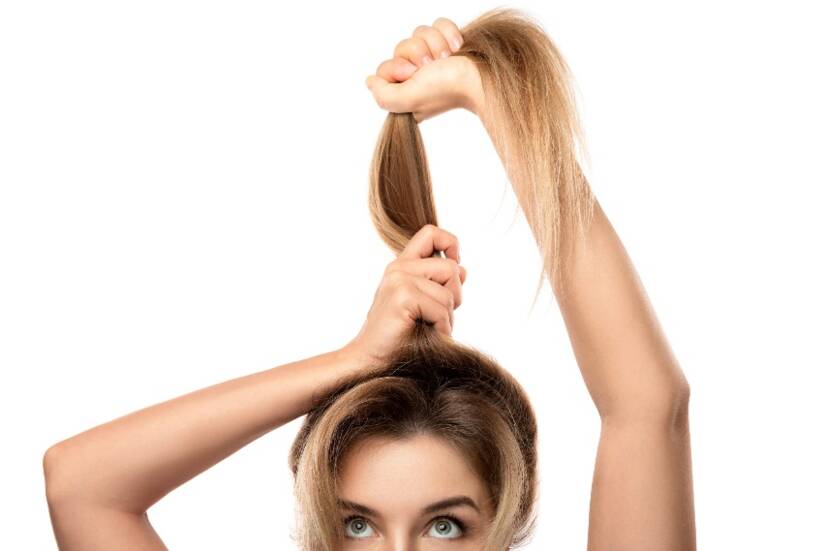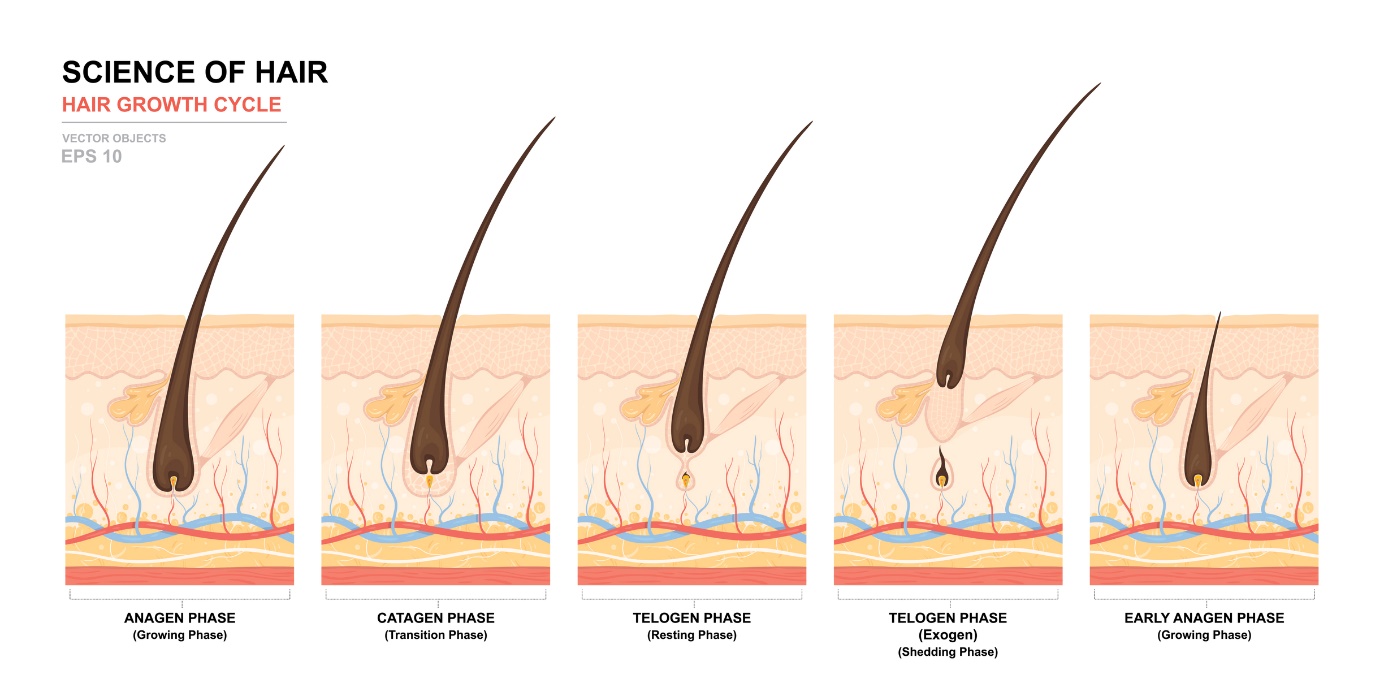- GOGGIN, Juliette and Abi RIGHTON. Beauty from nature: recipes for homemade cosmetics for skin, body and hair care. Translated by Lenka KERUMOVÁ. In Prague: Metaphora, 2017. ISBN 978-80-7359-517-3
- PIZINGER, Karel and Tomáš FIKRLE. Dermatovenerology. [Plzeň].
- healthline.com - How to Establish the Right Hair Care Routine for You. Healthline. Cynthia Cobb, DNP, APRN, WHNP-BC, FAANP
- solen.sk - Hair Diseases I. Solen. prof. MUDr. Mária Šimaljaková, PhD.
Promoting hair growth: what helps and how to grow? + Tips for healthy hair

Many of us long for long, thick hair. It is important to remember that the amount, shape, colour and strength of hair also depend on genetic predispositions. However, hair growth and quality can be significantly improved by lifestyle and proper care. What helps promote hair growth? What should we avoid?
Article content
Physical and mental health, a nutritious diet, the right lifestyle and hair care are essential.
Hair growth and structure must be supported from within and without.
Hair loss and growth, hair growth cycle, effective tips, appropriate diet, vitamins and many interesting information can be found in the article.
Why doesn't hair grow?
In addition to genetic predispositions, several other basic factors affect the rate of hair growth:
- Age, gender and ethnicity
- Hormonal balance
- Lifestyle
- Physical and mental health
- Hair care
Hair is considered to be the crown of beauty and losing it can cause psychological discomfort. The middle to older age group is particularly affected by slowed hair growth and hair loss.
However, hair problems can appear much earlier. Some people, on the other hand, may not be affected at all.
Possible causes of reduced hair growth and quality:
- Incomplete diet
- Lack of necessary vitamins and minerals
- Hormonal changes and imbalances
- Side effects of drug treatment
- Period of pregnancy
- Excessive stress and tension
- Thyroid disorders
- Autoimmune diseases (alopecia...)
- Skin burns (seborrhea, psoriasis...)
- Drastic weight loss
- PCOS - polycystic ovary syndrome
How fast does hair grow?
A person grows approximately 1 to 1.5 cm of new hair per month, on average 12 to 15 cm per year. If you lose 50-100 hairs per day, there is no reason to panic. This hair loss is physiological.
The rate of hair growth is influenced to some extent by genetics, health, lifestyle and the care itself.
Hair loss and growth can also be affected by the season. Autumn is the least favourable.
Each hair goes through different phases of growth independently of the other hair on the head.
The hair growth cycle has 3 basic phases. Some of them can last for several years.
- Growth phase (anagen)
- In this phase, a new hair is formed by cell division. This is the growth period. This process lasts from 2 to 7 years individually.
- Transitional phase (catagen)
- In the catagen phase, the hair stops actively growing. It is then released from the hair shaft and gradually weakens. This short transitional phase lasts from 2 to 6 weeks.
- The resting phase (telogen)
- During the telogen phase, old hair falls out. The hair follicle renews itself and new cell division, or the anagen phase, begins again. This resting phase lasts 2-4 months.
In people who do not suffer from the problem of hair loss, a large amount of hair on the head is in the anagen growth phase. Approximately 10% of hair, on the other hand, is in the telogen, resting phase.
The problem of hair loss begins when the resting phase is too long or when more than 15% of the hair goes into this phase. In such cases, increased hair loss and a decrease in hair density can be observed.

Effective support for hair growth
Some factors, such as genetic factors or certain diagnoses, cannot be directly influenced. However, promoting the growth and quality of the hair structure starts from within.
Although it may sound like a cliché, the foundation of nourished hair is a wholesome diet with plenty of necessary nutrients.
The quality of growing hair is also influenced by external factors such as cosmetic care, hygiene, amount of heat treatment, nutrition, etc.
A complete diet - enough vitamins and proteins
The diet should be balanced and complete, containing all the necessary vitamins and minerals. A sufficient protein intake is also important, as the basic building block of hair is the protein keratin.
It is important to hydrate the hair and skin not only from the outside but especially from the inside. Adequate and regular drinking of clean water is essential.
Vitamin C is essential for the synthesis of both collagen and keratin, which are essential for strength and healthy hair growth.
The B-complex is one of the most popular hair vitamins. Biotin (vitamin B7) and pantothenic acid are used as substances for the treatment of hair loss. Biotin promotes the growth of new hair and strengthens the structure of already grown hair and nails. Vitamins B3, B6 and B12 are also important.
Vitamin D supports skin health and hair follicle formation. People with vitamin D deficiency often develop alopecia. It plays an important role in calcium homeostasis, immune system regulation and cell growth.
A sufficient supply of both vitamin A and vitamin E is recommended. They have beneficial effects on the scalp and hair growth itself.
Of the minerals, iron, selenium and zinc are particularly important for hair growth. Zinc supports the health of the hair follicles. It improves their function, prevents hair loss and accelerates hair renewal. Silicon and calcium also play an important role.
What foods to include in the diet for healthy hair?
- Animal proteins (meat, fish, eggs...)
- Vegetable proteins (chickpeas, tofu, quinoa, potatoes...)
- Legumes (beans, lentils...)
- Vegetables (leafy greens, broccoli, spinach, tomatoes...)
- Fruits (berries, citrus fruits...)
- Nuts and seeds
In the diet, vitamins, minerals and proteins should be taken mainly. In case of a lack of nutrients from the diet, it is possible to reach for hair supplements.
An interesting feature of some supplements is the plant components that are not commonly found in the diet. Examples are nettle, horsetail, aloe vera, bamboo and others.
Suitable hair cosmetics
In the case of hair cosmetics, the most important thing is gentle cleansing of the scalp and appropriate hair cosmetics. You should reach for shampoos that are suitable for your hair and scalp type. If in doubt, it is advisable to consult a dermatologist.
Shampoos should not weigh down or dry out the hair too much.
To promote hair growth, it is advisable to choose products containing regenerating and stimulating substances such as caffeine, quinine, keratin, ricin, nettle and others. These substances improve blood circulation to the scalp, which is one of the essential aspects of hair growth.
When choosing shampoos, also look for products without parabens and silicones.
However, shampoo alone may not be enough to promote growth. It is therefore advisable to support your hair care with a hair serum or toner.
The primary function of a shampoo is cleansing. A serum is a concentrated product with the aim of stimulating hair growth. It is applied directly to the scalp.
You can also promote hair growth in the form of homemade masks. To promote hair growth, focus more on the scalp, but it is necessary to strengthen and nourish the regrown hair lengths.
Read also:
Hair masks: 10 homemade tips for damaged, oily and dry hair
Natural oils such as coconut, argan, jojoba or olive are suitable. Castor oil is good for the scalp as it stimulates the growth of hair follicles.
Gentle hair care
A healthy scalp is a prerequisite for healthy and thick hair. Stimulating the scalp helps improve circulation and promotes new hair growth.
Scalp self-massage is also suitable, for example when shampooing or applying a serum. The massage should be gentle, pleasant, painless and should not tear the hair.
Hair does not need to be washed every day.
On the contrary, it is preferable to wash it twice a week. If it is not oily, once a week is sufficient. Do not wash your hair in water that is too hot, but rather in pleasantly lukewarm water.
Experts recommend rinsing the hair with cold water at the end to "close" the scalp. Cold water circulates the blood, does not dry it out and closes the hair cuticles.
However, cold water is not suitable for washing alone. The cuticles (surface) must be open to allow all the necessary shampoo ingredients to penetrate the hair.
Wet hair is fragile and quite susceptible to damage.
Rubbing wet hair against a pillow can cause it to split and weaken. Therefore, do not go to bed with undried hair.
If we want to restore damaged hair, it is necessary to exclude heat treatment of the hair. Hair straighteners, curling irons, hair dryers, etc. High temperatures dry and weaken the hair considerably. This leads to split ends, breakage and subsequent hair loss.
If you can't do without heat treatment, limit its use to low heat settings and use heat protectants before use.
Tips for external hair care:
- Avoid frequent hair washing
- Do not wash hair under hot water
- Limit heat treatments
- Self-massage as scalp stimulation
- Stimulating gentle hair shampoo
- Nourishing conditioner for hair lengths
- Oil as nourishment for hair ends
- Scalp serum as a growth stimulator
- Nourishing hair mask once a week
- Use of a protective product before heat treatment
Lifestyle (stress, sleep...)
In addition to the diet itself, the physical and mental state of the organism plays an important role.
Stress is one of the most important factors contributing to both hair loss and hair growth. Excessive chronic stress can disrupt the physiological cycle of the hair.
This is due to the fact that stress hormones can disrupt the hair life cycle (especially the anagen growth phase).
If you are trying to grow hair faster, you need to eliminate the stress factor and excessive mental stress.
Sleep is important for the human body. The body regenerates and replenishes energy during the night.
If the regeneration period is shortened and disturbed for a long time, the immune system gets out of balance. The consequence is susceptibility to illness, fatigue, lack of absorbed nutrients and also weakened hair roots.
Interesting resources
Related










